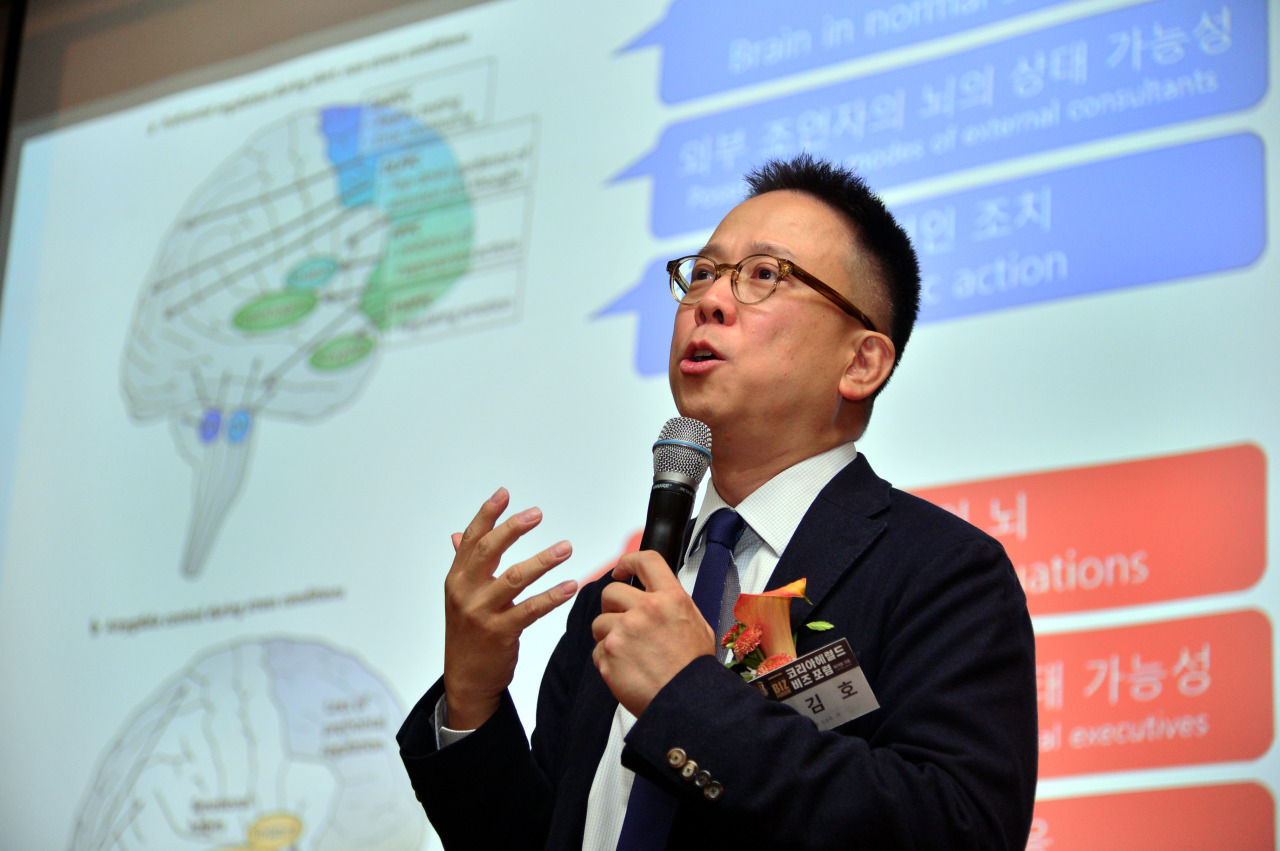The worst path a company can go down in times of business crisis is to deny responsibility, attack victims, defend itself and delay a public apology, said Kim Hoh, founder and CEO of The LAB h, at The Korea Herald Biz Forum on Friday at the Shilla Seoul.
The problem is that may just be what our brains are designed to do.
Kim, citing socio-psychological research, illustrated that under stress, the brain’s emotional control system dominates over its reasonable decision-making capability, and drives people to make the wrong reactions in reflex instead of making strategic actions.
 |
Kim Hoh, CEO of The LAB h, speaks at The Korea Herald Biz Forum in “Korea in Crisis: How to Survive in an Era of Trade Wars and Industrial Risks,” Friday at the Shilla Hotel in Seoul. (Park Hyun-koo/The Korea Herald) |
“The reason I can offer advice to my clients in times of their crisis is not only because I have expertise, but because unlike them who are directly involved, I can think objectively as an observer,” Kim said.
“My friends often presume that I must be my own troubleshooter. But hypothetically, if I am the subject swept up in crisis, the first thing I would do is question my judgement,” Kim said, adding, “The next thing I would do is call someone reliable who has no conflict of interest and ask what he or she would do in my shoes.”
In a corporate setting, this is sometimes difficult to achieve as lower-ranking subordinates here customarily side with their superiors out of a sense of respect.
“When there are two people whose opinions are the same, one of them is not doing any thinking,” Kim said.
It gets even trickier when the decision-maker is also the crisis-maker, as in the case of CEOs and ownership families wreaking havoc on public relations.
“In this case, there is nothing much that can be done before the management leaves the table of their own accord,” Kim said.
The best way to regain public trust is to accept responsibility for whatever inadvertent mistake or conscious wrongdoing has been done, open up contact with victims or press and create the chance for recovery, Kim said.
According to Kim, equally important or more so than the apology itself is the context in which the company broaches it.
“Think of three bucketfuls of water -- one hot, one cold and one lukewarm. Put one hand each in the hot and cold bucket and then move both hands to the lukewarm one. Despite being placed in the same temperature, our brain feels differently for each hand,” Kim said. “The same applies to public reactions -- they feel differently when a company suddenly offers an apology after denial and delay compared to when it follows up after acceptance and remedial approaches.”
The effects were striking in the case of Ewha Womans University Medical Center in Mok-dong, Seoul, where four infants died while being treated at a neonatal intensive care unit in 2017, Kim said. The hospital had convened a press briefing without inviting the bereaved family, nor meeting with them in advance or offering a direct apology. Angry family members of the victims stormed the live media event, creating a nightmare scenario for the hospital’s public relations team.
“Through my 20 years of experience in strategic communication and crisis management, one insight I have gathered is that to have others talk about my advantages and myself talk about my shortcomings,” Kim said in his closing remark.
“Tooting one’s own horn is the least credible promotion, which is why many of us wish the media would write favorably about us. On the contrary, it reflects best on us when we are the loudspeakers for our mistakes before the authorities or rivals attack,” Kim said.
Kim was one of the four speakers at the second The Korea Herald Biz Forum, along with Dmitris Psillakis, chairman of the European Chamber of Commerce in Korea, Richard Levick, CEO of the Levick consulting firm, and Lim Sung-taek, co-founder and managing partner of the Jipyong law firm.
By Lim Jeong-yeo (
kaylalim@heraldcorp.com)








